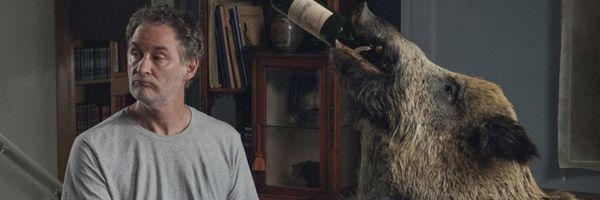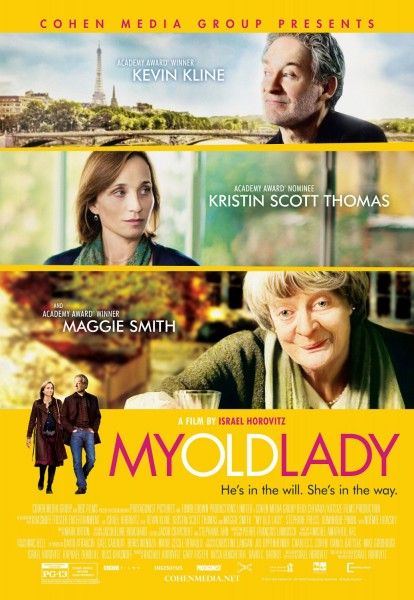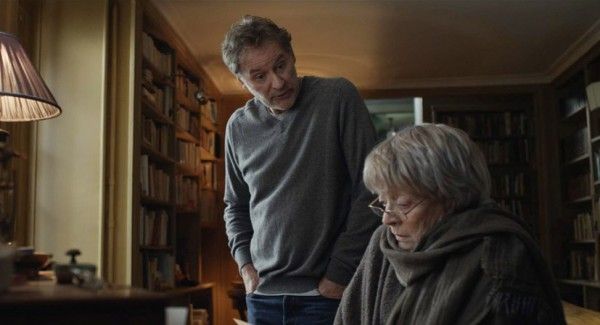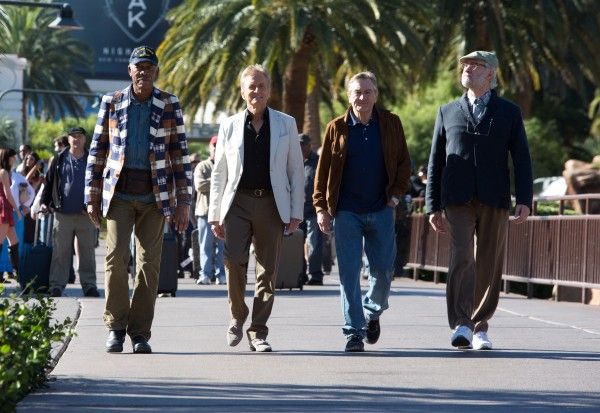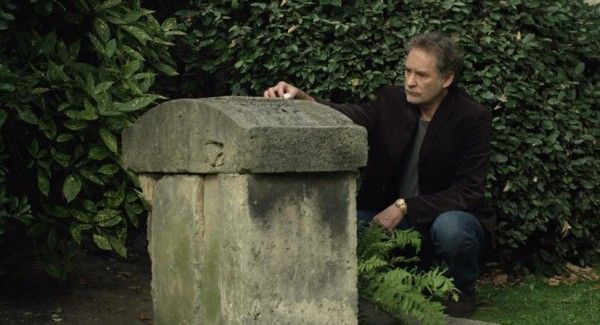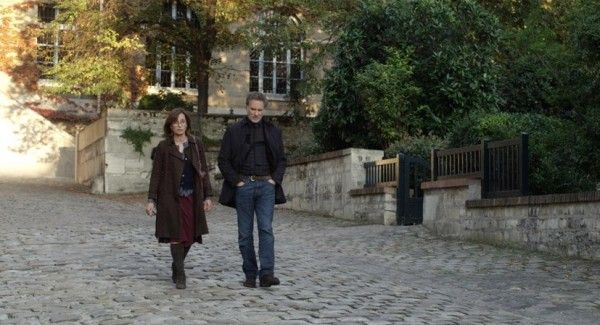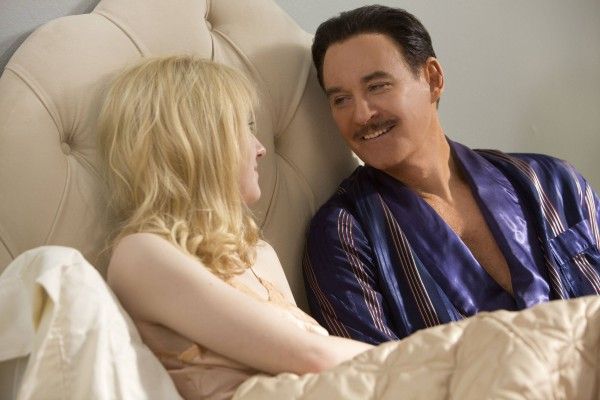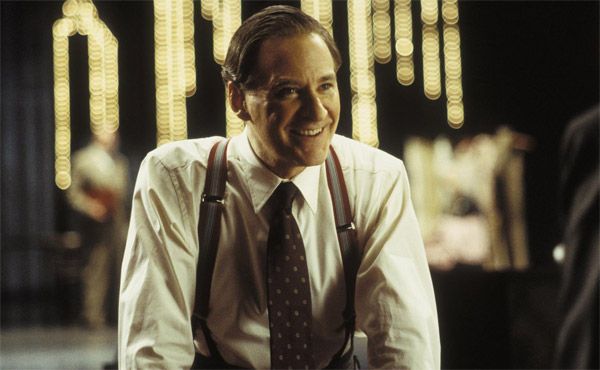Never in my life would I have guessed I’d be able to teach someone as accomplished as Kevin Kline about anything at all, but it turns out, he doesn’t know all that much about motion capture. However, that’s only one thing compared to the wealth of memories, techniques and industry insight he had to share with me during our interview for his upcoming film, My Old Lady. Kline leads the big screen adaptation of Israel Horovitz’s play as Mathias, a man who travels to Paris to cash in his inheritance, a high value apartment. Trouble is, it’s a “viager,” so he won’t actually own the place until the current tenant, Mathilde Girard (Maggie Smith), passes away. Until then, he actually has to pay her a fee according to the unusual French system.
In addition to discussing his experience making My Old Lady and breaking down the motion capture technique, we also talked about the challenges of playing Errol Flynn in The Last of Robin Hood and when he’ll begin shooting Jonathan Demme’s Ricki and the Flash. Hit the jump to check it all out.
Question: You have this movie, The Last of Robin Hood and then the last movie I saw you in before that was Last Vegas. They’re all completely different, so can you tell me a little bit about your decision making process?
KEVIN KLINE: It's the same old process, which is completely intuitive, arbitrary and random. I just respond to a material and it’s either, ‘Yeah, I'd like to do this,’ or, ‘I don't think I need to do this.’ Or, ‘Am I going to learn anything from this,’ or, ‘I don't have much to contribute to this.’ Although that sounds really altruistic. I guess I like to do movies to which I can contribute. ‘My bounty is as boundless as the sea.’ It's very selfish. You do it for selfish reasons. Like, I remember when I first started out, people said, ‘You know what career is? Do work that leads to other work.’ I'm passed that and I sort of think I got passed it very early on. I do work that leads to no more work, ever. [Laughs] I just don't care what leads to what. I'm an actor for hire. I don't read a dozen books a month and then option them and develop them into films myself. I admire actors who can do that. That's great. I just wait for something to come across that interests me, challenges me, intrigues me and/or pays me a lot. [Laughs] Ideally, if you get all those ingredients then you're really lucky.
But you did develop this one a bit.
KLINE: Well, inadvertently. You don’t sign on. You go, ‘Yeah, I'm interested,’ and so then Israel calls, ‘Let's have a reading. We’ll read the play.’ And then, ‘Let's have a meeting. We’ll talk about the movie adaptation.’ ‘Okay, whatever.’ ‘I’ve done a first draft of the movie adaptation; let’s have a reading of that. We’ll get some actors together.’ This goes on for three or four years and you think, this is never going to get made, but it's interesting to watch such a gifted playwright and screenwriter struggling with this transmuting or transformation of one of his plays into something cinematic. And then one day you get a call saying, ‘We've got the money. We’re shooting it.’ You go, ‘Oh, wow, okay,’ and you're in up to your eyeballs. I had sort of come to accept it as, this is just gonna be something and we're just gonna develop it. In this economy no one's gonna make it. Same thing with the Flynn thing. I never thought that would get made.
Yeah, but we need different movies like that. I’m just coming off of Ninja Turtles so seeing something like this that digs so deep into simple human connections is kind of refreshing.
KLINE: Oh, how is that?
I'm a kid from the 90s. I grew up loving Ninja Turtles so I'll watch anything with them in it. It might not have been the best movie though.
KLINE: It’s a large medium that can embrace Apes, Ninja Turtles … [laughs].
Would you ever think about doing one of those big movies? I think that's probably one of the few things you haven't done. Actually, that and horror. I think you should do a horror movie.
KLINE: Somebody just asked me, are there roles that you want to - it's not so much role as genres. I've never done a horror movie, at least not intentionally. [Laughs] I've done some horrible movies. A good horror movie would be fun. Not just a scary movie, but a really good horror movie. Did you see Tell No One?
I have not.
KLINE: A French film. It’s very good. And Caché with Daniel Auteuil. Psychological thrillers where the audience is kept in the dark until the end. That could be great. King Lear is a horror movie in a way, gouging out this guy's eyes, horrible things. Titus Andronicus is certainly a horror movie of a play of sorts, but I’ve digressed. A horror movie. Yeah, I would love to do that. I did one hugely expensive, big production with a lot of green screen and stuff like that.
Last Vegas put the bug in my head because now we’ve got Michael Douglas in Ant-Man.
KLINE: He’s in what? What’s that?
It’s a new Marvel movie.
KLINE: And Michael’s doing Ant-Man? Is he part man, part ant?
It’s about a man who can shrink down to the size of an ant.
KLINE: Hmmm, they should do a hybrid. They should do Man From U.N.C.L.E. meets Ant-Man, so you get aunt and uncle.
They’ve actually been working on Man From U.N.C.L.E. for a while now.
KLINE: Well, they’re always trying to – they say, ‘What are last year’s two biggest hits? Can you write a movie that’s got the best elements of those two?’ Yes, we’ve got the man. The Ant-Man from U.N.C.L.E.!
I would watch that movie. [Laughs]
KLINE: [Laughs] Who wouldn’t? Have you seen the Ape movie?
I have.
KLINE: How is it?
It’s great! The motion capture in that is incredible. It just blows my mind how they can cover an actor’s physical performance through and through and use the suits to lay the ape over it. And it’s so real looking, too.
KLINE: Is that how they make it? Motion capture? So their wearing like green screens sort of and then they’re putting all that stuff …
I think it’s called retargeting. They’ve got the actor in the suit with the dots and then they match the digital character right up.
KLINE: Like Avatar. Cool!
They did it on Ninja Turtles, too.
KLINE: I wore a green leg in De-Lovely because they had to make my leg disappear after it’s amputated, but that’s as close as I’ve gotten to – what do they call it?
Motion capture.
KLINE: Motion capture!
It had to have developed from things like that though.
KLINE: Yeah, it all started with De-Lovely, I think. [Laughs]
Can you tell me a little bit about taking this from stage to screen? I’ve seen a lot of play adaptations that are noticeably stage-like, so is there anything you can do to ensure this has a cinematic feel to it?
KLINE: [It’s] a play that takes place in one room, that’s the set. Israel was just talking about having seen - they’re playing it at the Moscow Art Theater as we speak. Actually, they’re on at this time right now. They’re just taking their curtain call! But he’s seen the play done in so many different languages all over the world, and he was watching it in Moscow and just thinking, ‘Paris. It’s all in one room and Paris is a character and this very important character in the play,’ and that’s where he first got the idea of opening it up into a screenplay, you know, to include Paris. One of my favorite movies is My Dinner with Andre. Now, someone says, ‘I’m making a movie about two guys talking at a table,’ most studio heads would says, ‘Yes? And then they go out and there’s a car chase, right?’ Or motion capture. No, there’s a great conversation. And that was a play. Originally he wrote it as a play. There are a lot of plays that have been successfully transferred to cinema. What about Streetcar Named Desire, for example? Hundreds more. Anyway, the point being, it was interesting to watch this process. A lot of the action of the story happens in conversation. There’s no sudden explosion off screen and 100 apes come running into the room, no.
You have one explosion.
KLINE: [Laughs] As soon as I said that I was gonna say, ‘Wait a minute. There is sort of an explosion off screen!’ I take that back. It’s an action adventure!
How about working with Kristin Scott Thomas and Maggie Smith? You’ve worked with Kristin before, but not Maggie, so is there any tapping back into what you did in the past and then bringing Maggie into it?
KLINE: No, you just get passed the icebreaking like, how does this person work or whatever. We knew each other. We were friends. I’ve seen Kristin. We had dinner together at a party because I did a movie in France and the producer threw a party and I saw her there. And I saw her in a play in London when I was shooting there and she was doing Three Sisters, so we’ve kind of kept in touch over the years. So there was just a comfort level, I suppose. But you know, it’s an interesting idea, building consciously on, ‘Now in our last, you were my ex-wife, but there was still a lot of acrimony. But then there was love. So you could say there was acrimony and eventually love of a kind in this, so let’s build on it.’ First of all, most actors and especially English actors, they don’t like to talk about it. I don’t like to talk about it. I remember when John Gielgud came to Julliard when I was a student there, he was doing a play on Broadway with Ralph Richardson, a David Storey play about two men in a home for the senescent, aged, and someone asked, ‘Does the play mean …’ He said, ‘We really don’t talk about it. I don’t believe in talking about it too much.’ And that, I found subsequently, to be pretty much the M.O. of many English actors. Just get on with it. You know what I mean?
So what happens when you encounter someone who needs to talk it through first?
KLINE: I say, ‘Don’t speak. Don’t speak!’ You know that Dianne Wiest moment in Bullets Over Broadway? When actors say, ‘You know what I’m really playing here, you know what my subtext is,’ I go, ‘Don’t tell!’ I don’t want to know. It’s not gonna help me. I just want to react to what you’re doing. I don’t want to know what you’re really thinking, what your motivation is. No! Who cares? You deal with that.
Is it the same process for you on something like The Last of Robin Hood? I feel like you might need to talk to Dakota [Fanning] a bit before jumping into certain scenes.
KLINE: You mean some of those intimate scenes? Those were so chased. There really was not much to discuss. It wasn’t like a hot love scene, but yeah, there the director discusses, ‘We’ll see you start to undo your belt and then we’re gonna pan up so you can just mime the rest and then we’re gonna pan over to her face and then we’ll get a shot looking up at you …’ That’ll be attractive. [Laughs] That’s something I don’t want to ever see, something I’ve never had to see before nor would I want to. But yeah, there’s some discussion of that, but there always is and in fact it’s very technical. I remember doing this scene, ‘Okay, you’re dancing with her. Now we’re gonna follow your hand. Slow down! Slow down! Now you’re just getting under … now you’re down her leg, now you’re on her butt. Okay, slow down, slow down!’ You’re being talked through this. It’s not what you might think. [Laughs] It’s very technical.
Even then, you still make me believe because while watching it, I’m busy assessing the relationship and thinking, ‘That’s just wrong,’ but at the same time, I do buy that those two characters really have feelings for each other.
KLINE: Did you? Fantastic! I haven’t seen the movie, but I felt during the making of it that I did too much research. I knew too much about Errol Flynn and Beverly and Florence. But having read all these different biographies, you stop believing everything you read because you go, ‘Wait a minute.’ And it started with De-Lovely, Cole Porter, there were certain biographies …
Everything started with De-Lovely!
KLINE: It’s all coming back to that! This whole stop action, stop … what is it?
Motion capture.
KLINE: Motion, emotional, prisoner, Stockholm effect. [Laughs] It started with that film. I read these different biographies on Cole Porter. Here’s this anecdote, you know, the famous story when Cole Porter said this to this person. Well, then you read another biography that says, ‘No, it wasn’t actually Cole Porter who said that. It was this guy who said that to Cole Porter and it was like 10 years later.’ And Flynn, talking about his autobiography My Wicked, Wicked Ways, there’s a lot of confabulation. First of all, there’s a book written about the guy hired by the publisher to go down to Jamaica and get Flynn to finish writing the book because he couldn’t. He just hated what he had done. And it’s a book just about the two of them drinking and whoring for 10 weeks and getting him to finish the book. [Flynn] apologized to a friend. He said, ‘Don’t feel bad that your name is not in it. I respect you too much to make you part of that fiction.’ I learned so much about Flynn. I learned a lot about the myth that he perpetuated. How much of it is true though? I don’t know. But from all accounts, they had a very passionate love affair. I read some of his letters. Her daughter came to Toronto when the film was launched last September and they had just recently found a bunch of letters that Flynn had sent her when he was in Africa and I read those. It was very interesting. You read and you hear stories about this wild adventurous, insane, insatiable, Rabelaisian, appetitive – is that a word? He was just completely ruled by an appetite that was enormous. And then you hear a prankster and a joker and he loved to shock you, but probably you could also just have a nice chat with him sometimes.
To wrap up, can I ask you a bit about Ricki and the Flash? They feel like such an unusual combo because when I think Diablo Cody, my mind goes straight to her comedy and then when I think Jonathan Demme, it’s Silence of the Lambs.
KLINE: You think of Silence of the Lambs when you think of Jonathan?
I’m a bit of a horror nut, so I’ve been watching that one since I was way too young.
KLINE: I go back to Melvin and Howard and things like that, and some of his documentaries. He’s all over the place genre-wise, I think. Silence of the Lambs was pretty scary. What can I tell you about it? We’re shooting it in October.
What’s the tone of it?
KLINE: That’s a damned good question. I’m curious to see what the tone is. I won’t know until we’ve done it.
What do you get from the script? Or do you have any idea how you’ll approach the role?
KLINE: I don’t know. It depends what the other people are doing, too. Like My Old Lady, there’s definitely drama in it and there’s definitely comedy in it. What the final ingredients are which dominate – it’s one of those things that, as an actor, I don’t know. Jonathan might see the whole thing frame-by-frame in his head, but I don’t get the feeling that he’s that way. He likes to watch it evolve, too. It ain’t over until it’s over, and that’s the final sound it makes or the final edit where they’ve changed the ending; ‘Oh, we just dropped out one line so actually, you’re guilty.’ ‘Oh, that’s different!’ [Laughs] I’ve done those movies! I did a movie where my wife who was the bad guy, ‘We changed it. She’s now a victim.’ ‘That’s different!’ Things can change, but it’s an interesting tone. Tonally, I can’t tell you, but I think it will be a dramedy or a comegy or a dramatic cromagon with a lot of action, stop emotion, motion placement.
Watch, the next time I see you, I’ll be interviewing you for a motion capture role and get to say, I told you so!’
KLINE: [Laughs] Yes, and I’d like to thank my motion caption control person who made my performance!
My Old Lady arrives in select theaters on Wednesday, September 10th.

